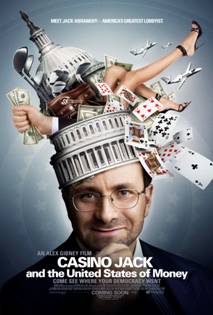 Casino Jack and the United States of Money
Casino Jack and the United States of Money
Directed by: Alex Gibney Cast: Jack Abramoff, Tom DeLay Running Time: 2 hrs Rating: R Release Date: May 7, 2010
PLOT: A documentary about lobbyist Jack Abramoff and the many scams he took part in while hobnobbing with the top members of Congress. From the director of Enron: The Smartest Guys in the Room.
WHO'S IT FOR?: This isn’t just for political junkies, but for anyone who's interested in receiving a thorough education on a complicated but very real villain. Those who are politically inclined should be prepared to watch Tom DeLay and others get their names dragged through the mud, and then some.
EXPECTATIONS: Going in, I knew little about this film, and not so much about Abramoff.
SCORECARD (0-10)
TALKING: The talking heads are balanced with politicians and the authors who may have written about them. Nina Easton, author of “Gang of Five,” Thomas Frank, author of “The Wrecking Crew” and fellow members of Abramoff’s College Republicans group are among those who speak openly about the ill-doings of Casino Jack. Personally involved politicians, including Bob Ney, Neil Volz, and Tom DeLay play ball, but are admittedly reserved on a few topics. Abramoff only speaks for himself through C-Span footage and interviews. Score: 8
SIGHTS: The saga of Jack Abramoff is broken into chapters, with re-enactments only used a couple of times in the entire film. Utilized more often are film clips, especially scenes from Jimmy Stewart’s heartwarming patriotic moments in Mr. Smith Goes To Washington. Director Gibney also provides some striking footage and photographs from Abramoff’s more radical days as a college republican, which includes a look at a very younger version of Karl Rove. Score: 7
SOUNDS: The sound features a collection of popular rock songs that add lyrical relevance to the documentary, along with an air of lightness. The Flaming Lips’ “The Yeah Yeah Yeah Song” is especially fitting for a movie about Abramoff with the lines, “If you could make everybody poor, just so you could be rich, would you do it?” and “With all your power, what would you do?” Score: 6
PLOT SPOILERS
BEST SCENE: Abramoff loved to use email. It is amazing to me that politicians have no problem in using bad grammar or saying offensive things in their correspondence, even if they are using unofficial means. But without such oddness, there wouldn’t be the hilarity that ensues during this particular scene. Stanley Tucci narrates Abramoff's astounding emails.
ENDING: Some people are sent to Club Fed, some are more deserving than others, but we’re still dupes.
QUESTIONS: I am not the most informed person on the subject, so I would be curious to hear what our more conservative readers have to say about this documentary. Any reactions from our right-wing TSR followers?
REWATCHABILITY: Abramoff makes for a fascinating bad guy, so the documentary is absorbing enough to be revisited a second time. Like a good doc, it is bound to inspire some curiosity about the man and his exploits (though I must warn you that Wikipedia’s information is a little shorter. There will at least be a drive to really check out the narrative film Casino Jack, which has Kevin Spacey playing the title character. Co-starring Jon Lovitz, that movie is set to be released on December 1, 2010. That’s three days before Abramoff gets out of jail.
OVERALL
Walking out of the courthouse in 2006, many people noted that perhaps Abramoff’s black hat and trench coat was finally admittance that he was playing the role of a “bad guy.” After watching Alex Gibney comprehensive re-telling of Abramoff’s complicated saga of malevolence, this is only fitting. Abramoff is like the best of villains. Like Blofeld, James Bond’s recurring nemesis who was at the core of many evil schemes, Abramoff utilized those above and below him to work towards his dream of how the world should operate. For Casino Jack, his idealism soon became mixed with inflating corruption. Also like Blofeld, after seeing his exploits, one might find dropping him down a smoke stack to be somewhat of a fitting punishment (instead of four years at Club Fed).
Only attacking our “United States of Money” at the end of the documentary, this portrait of a compelling villain says that we the people can be the James Bonds against folks like Abramoff, as shown through the consistent usage of Jimmy Stewart’s performance in Mr. Smith Goes To Washington. Abramoff’s many intricate shenanigans, which range from exploiting Native American tribes for campaign funding to controlling an entire island in the Marianas, are all told in thorough detail in Gibney’s fast-moving and always fascinating documentary. It’s slightly discouraging when Gibney seems to skip over the names of involved Democrats, but with the anger fuming from his organized documentary, Gibney makes it equally fascinating and frustrating to watch a very rich “con-man” find new ways to reinvent the wheel of evil.
FINAL SCORE: 7/10
